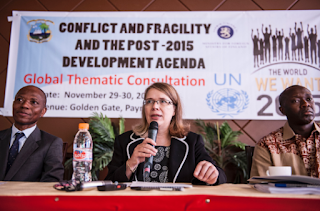A major regional forum in
Monrovia has called for peace and security to be one of four core dimensions of
the world’s development framework beyond 2015.
Representatives from eight
governments, civil society organizations, academia, the media, trade unions,
youth, United Nations (UN) agencies, and the African Union, wrapped up a
two-day event in Monrovia on Friday by agreeing that commitments to achieving peace
and security should be part of a global development framework once the
Millennium Development Goals (MDGs) reach their target date in 2015.
The forum, hosted by the
governments of Liberia and Finland, is the latest in a series of United
Nations-led consultations enabling input from a wide cross-section of society
on how issues concerning disasters, conflict and citizen security can be
integrated into a new universal development framework.
Speaking at the event, Liberia’s
President, Ellen Johnson Sirleaf, who is one of the co-chairs of the UN
Secretary-General’s High-level Panel on Post-2015, emphasized the importance of
inclusiveness and of involving youth in the discussion, all the way to 2015 and
beyond. She also stressed the need for international development agencies to
prioritize the promotion of peace and security. “There will be no peace without
development and no development without peace,” the President said.
During her opening address,
Finland’s Under Secretary of State for Development Cooperation and Development
Policy, Anne Sipiläinen, said it was important for a wide variety of actors to
be involved in the discussions on future development goals. “This meeting is a
good opportunity to discuss debate and formulate global goals in a truly inclusive
and participatory manner,” she said.
The consultations on conflict and
fragility are led by UNICEF, the UN Peacebuilding Support Office, the UN Office
for Disaster Risk reduction and the UN Development Programme, and are part of
an unprecedented global consultation process on the post-2015 development
agenda.
Main outcomes of the Monrovia
consultation included:
- Shared recognition that achieving peace is a multidimensional endeavor and agreed with the United Nations Task Team report that peace can no longer be separated from the world’s development framework.
- Recognition that eradicating violence is a fundamental part of human progress, but achieving peace is about much more than the absence of violence, and depends on progress in addressing the drivers of violence.
- Concern that the concentration of development deficit and poverty in countries affected by conflict and violence around the world.
- The participants welcomed the progressive development of the New Deal and the Peacebuilding and Statebuilding goals by the g7+ and believed the post-2015 framework should be informed by these concepts in crafting commitments that would address conflicts in fragile states.
- Across the post-2015 framework, it will be important to realize a vision for better governance that leads to inclusive, responsive, accountable and fair state-society relations.
- The issue of equality needs to be addressed across all goals, targets and indicators, so that they ensure that no group is left behind. Therefore targets need to be disaggregated by gender, ethnicity, religion, geography and caste.
The need to involve youth was
emphasized by Isabel Crowley, UNICEF representative in Liberia, “When we think
beyond 2015, we think of the younger generation—children, youth and
adolescents—and how so much of their future has been lost to conflict. We have
a powerful opportunity here to begin changing that.”
Also speaking at the event held
on 29-30 November, Liberia’s Acting Minister of Planning and Economic Affairs,
Amara M. Konneh, said the very foundation of collective development plans going
forward must be country-led and country-owned . “The country-led approach must
not only entail government leadership in implementation, as the custodian of
the state; but also the cultivation and empowerment of domestic private sectors
as the drivers of development.”
Conflict, violence and disasters
are widely recognized as significant obstacles to achieving the Millennium
Development Goals (MDGs) in many developing countries.
“Resolving conflict requires us
to resolve some of the issues of extreme poverty and inequity that exist in
Africa and other violence-prone countries around the world,” said Sam Doe,
Policy Advisor and Team Leader of the Policy and Planning Division at UNDP’s
Bureau for Crisis Prevention and Recovery. “The post-2015 debate, which focuses
on long-term goals, makes every effort to involve poor and marginalized people
– including women, men, boys and girls – from conflict affected societies in
the policy dialogue.”
Since 2000, disasters have
affected 2.7 billion people resulting in $1.3 trillion in economic losses and
1.1 million deaths. An estimated 526,000 people die violently every year
including 55,000 who lose their lives in conflicts.
A third forum on conflict and
fragility will take place in Panama at the end of January 2013 focusing on
citizen security, armed violence and its impact on development.
This will be followed by a
High-Level Consultation in Helsinki in February 2013, at which the outcomes of
the various elements will be debated and consolidated into a synthesis report.
The results of the consultations
will be available online at: www.worldwewant2015.org.


No comments:
Post a Comment